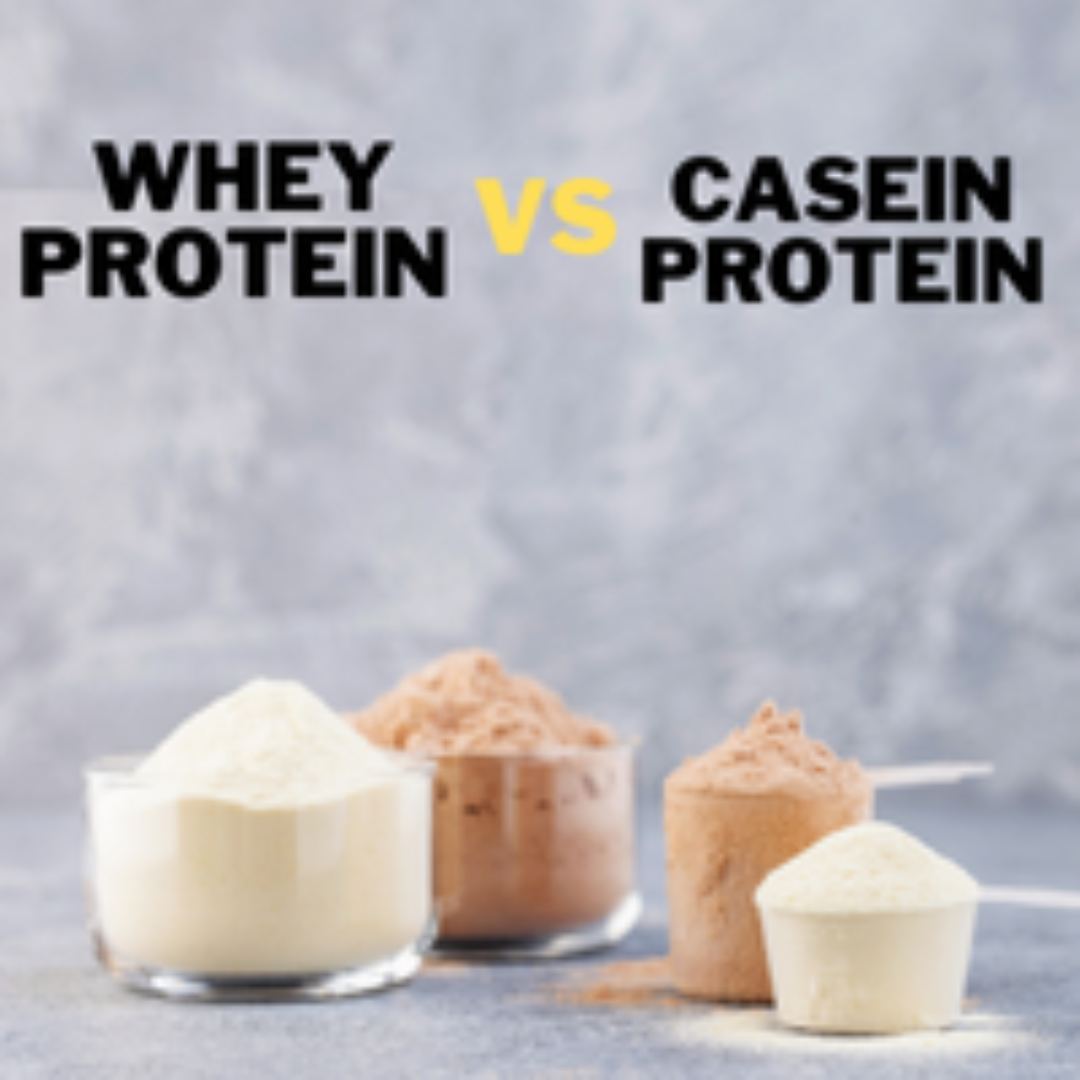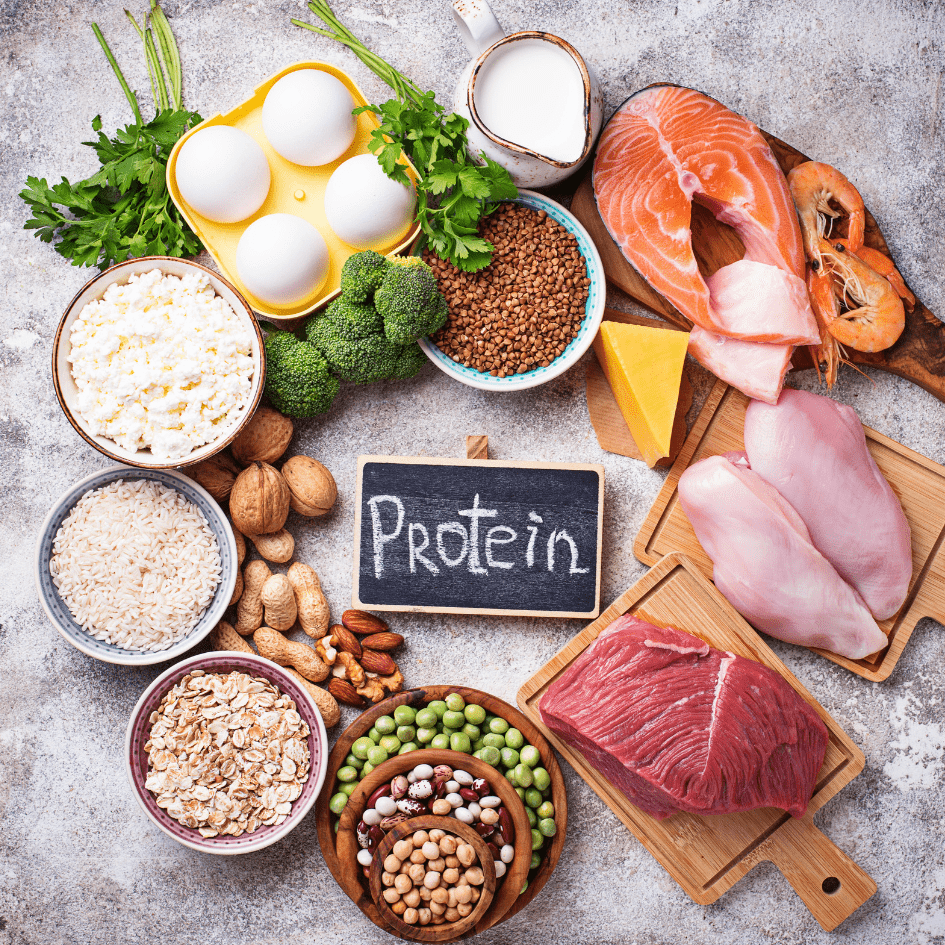The Great Protein Debate: Whey Protein vs Casein Protein!

Introduction of Whey Protein vs Casein Protein
Protein is an essential nutrient for building and repairing muscles, making it a crucial component of any athlete or fitness enthusiast’s diet. Protein supplements have become increasingly popular in recent years, with whey and casein protein being two of the most commonly used types. Whey protein is a fast-digesting protein that is derived from milk, while casein protein is a slow-digesting protein also derived from milk. In this blog post, we will explore the differences between whey protein vs casein protein, their benefits for muscle building, and which one may be better for individual fitness goals.
If you’re serious about building muscle, then you probably know that protein is essential for muscle growth and repair. But with so many different types of protein supplements on the market, it can be tough to decide which one is right for you.
Two of the most popular protein supplements for building muscle are whey protein and casein protein. Both types of protein are derived from milk, but they have some key differences that can affect their effectiveness in building muscle. In this article, we’ll take a closer look at whey protein vs casein protein and compare the benefits of each.
What is Whey Protein?

Whey Protein vs Casein Protein!
Whey protein is a fast-digesting protein that is derived from milk. It is a complete protein, meaning that it contains all of the essential amino acids that your body needs to build and repair muscle. Whey protein is a popular choice for athletes and bodybuilders because it is quickly absorbed by the body and can help to increase muscle protein synthesis (MPS).
There are several different types of whey protein supplements, including whey protein concentrate, whey protein isolate, and hydrolyzed whey protein. Whey protein concentrate is the most common type of whey protein supplement, and it is also the most affordable. Whey protein isolate is a more purified form of whey protein, with higher protein content and lower fat and lactose content. Hydrolyzed whey protein is a partially broken-down form of whey protein that is even faster digesting than whey protein isolate.
What is Casein Protein?

What is Casein Protein?| Whey Protein vs Casein Protein!
Casein protein is also derived from milk, but it is a slower-digesting protein than whey protein. Casein protein forms a gel-like substance in the stomach, which slows down digestion and releases amino acids slowly over time. This slow release of amino acids can help to promote muscle protein synthesis for several hours after consumption.
There are two main types of casein protein supplements: micellar casein and casein hydrolysate. Micellar casein is the more common type of casein protein supplement and is slowly digested over several hours. Casein hydrolysate is a more rapidly digesting form of casein protein that has been partially broken down for faster absorption.
Whey Protein vs Casein Protein: Which One is Better for Building Muscle?

Whey Protein vs Casein Protein: Which One is Better for Building Muscle?
So, which type of protein supplement is better for building muscle: whey protein or casein protein? The answer is that it depends on your goals and your individual needs.
Whey protein is a fast-digesting protein that is best consumed immediately after a workout or first thing in the morning. Both whey protein and casein protein have their benefits and drawbacks when it comes to building muscle. Let’s take a closer look at how they compare.
Also, read Plant-Based Protein Powder – The Ultimate Guide 2023
Digestion
One of the most significant differences between whey protein and casein protein is their digestion rates. Whey protein is rapidly absorbed by the body, providing a quick spike in amino acids in the blood. This makes it an ideal protein supplement for post-workout recovery when the body needs nutrients quickly.

The Great Protein Debate: Whey Protein vs Casein Protein!
On the other hand, casein protein is slowly digested, providing a sustained release of amino acids to the body over several hours. This makes it an ideal protein supplement for use before bedtime or when you will be unable to eat for an extended period.
Muscle Growth
whey protein and casein protein are effective for building muscle. However, whey protein may be more effective for promoting muscle growth due to its rapid absorption rate. Studies have shown that whey protein can stimulate muscle protein synthesis (MPS) more effectively than casein protein, leading to greater muscle growth.

Whey Protein vs Casein Protein
Satiety
Casein protein may be more effective at promoting satiety than whey protein. Studies have shown that casein protein can reduce hunger and increase feelings of fullness, which may help with weight management and reducing calorie intake.

Whey Protein vs Casein Protein
-
Cost
Whey protein is generally less expensive than casein protein. This is because whey protein is a byproduct of cheese production and is readily available, while casein protein is a more specialized product that requires more processing.
-
Taste
Both whey protein and casein protein come in a variety of flavors and can be mixed with water or milk. However, whey protein is generally considered to have a better taste and mixes more easily than casein protein.
This is a very tough call between whey protein vs casein protein to whom we choose.

Whey protein has several benefits for muscle building, including:
- Increased Muscle Protein Synthesis: Whey protein is rich in essential amino acids, particularly leucine, which is a key regulator of muscle protein synthesis. Studies have shown that whey protein supplementation can increase muscle protein synthesis more than other protein sources.
- Improved Recovery: Whey protein has been shown to reduce muscle damage and soreness after intense exercise, which can improve recovery time and help prevent injury.
- Increased Strength and Muscle Mass: Several studies have shown that whey protein supplementation can lead to increased muscle mass and strength, particularly when combined with resistance training.
Scientific Evidence Supporting the Effectiveness of Whey Protein
There is ample scientific evidence supporting the effectiveness of whey protein for muscle building. In a 2018 systematic review and meta-analysis, researchers analyzed 49 studies on the effects of protein supplementation on muscle mass and strength. They found that whey protein supplementation led to significantly greater increases in muscle mass and strength compared to other protein sources.
Recommended Dosage of Whey Protein
The recommended dosage of whey protein varies depending on individual goals and circumstances. The American College of Sports Medicine recommends consuming 1.2-1.7 grams of protein per kilogram of body weight per day for individuals engaging in regular exercise. For athletes and bodybuilders, the recommended dosage of whey protein is typically 20-30 grams per serving, consumed within 30 minutes after exercise.
Which One Should You Choose?

Choosing between whey protein vs casein protein ultimately depends on your fitness goals and personal preferences. If you are looking for a protein supplement to use after workouts or during the day to promote muscle growth, whey protein may be the better option due to its rapid absorption rate. On the other hand, if you are looking for a protein supplement to use before bedtime or when you will be unable to eat for an extended period, casein protein may be the better option due to its slow digestion rate and sustained release of amino acids.
It is important to note that neither protein supplement is superior to the other, and both have their benefits and drawbacks. Additionally, consuming a variety of protein sources, including whole food sources such as chicken, fish, and eggs, is important for a well-rounded diet and optimal muscle growth.
Benefits of Casein Protein for Muscle Building
Casein protein has several benefits for muscle building, including:
- Long-lasting Amino Acid Release: Casein protein is slowly digested and provides a slow and steady release of amino acids over several hours. This can help promote muscle protein synthesis and prevent muscle breakdown.
- Improved Muscle Recovery: Casein protein has been shown to reduce muscle damage and soreness after intense exercise, which can improve recovery time and help prevent injury.
- Improved Muscle Retention: Casein protein can help improve muscle retention, especially during periods of calorie restriction or fasting. This is because it provides a slow and steady supply of amino acids, which can help prevent muscle breakdown.
Scientific Evidence Supporting the Effectiveness of Casein Protein
There is scientific evidence supporting the effectiveness of casein protein for muscle building. A 2012 study published in the Journal of the International Society of Sports Nutrition found that casein protein supplementation led to greater increases in muscle mass and strength compared to whey protein in trained male athletes.
FAQs for Whey Protein vs Casein Protein
Casein Absorption Time

Casein Absorption Time
Casein is a type of protein found in milk that is digested and absorbed much more slowly than other forms of protein, like whey. Unlike whey protein, which can spike amino acid levels in the blood rapidly, casein provides a slower, more sustained release of amino acids. This makes it ideal for consumption before bedtime or during long periods without food, as it can offer a continual supply of essential amino acids for muscle repair and growth. The slow absorption rate of casein, which can take up to 6-8 hours, helps to provide a steady state of anabolism, potentially aiding in improved muscle synthesis and reduced muscle breakdown.
Casein Hydrolysate Benefits

Casein Hydrolysate Benefits
Casein hydrolysate is a form of casein protein that has been partially broken down, or hydrolyzed, to facilitate faster absorption. It offers several benefits such as quicker muscle recovery and lower allergenicity. Despite the faster absorption compared to regular casein, it still provides the benefits of casein’s time-release profile. It’s particularly useful for individuals who may have digestive issues with intact proteins or who need a quicker source of protein post-exercise. The hydrolysis process also makes it easier for the body to absorb the nutrients, which could lead to improved muscle growth and repair.
Casein Protein Digestion Time?
Casein protein takes longer to digest compared to other proteins like whey, owing to its unique interaction with stomach acids. It forms a gel-like substance in the stomach, which slows down gastric emptying and provides a sustained release of amino acids into the bloodstream. This process can take anywhere from 6 to 8 hours, making casein an excellent choice for nighttime nutrition or during periods when frequent meals are not feasible. The extended digestion time helps to mitigate muscle protein breakdown and supports muscle repair and growth over a prolonged period.
Casein Protein Powder vs Whey?

Casein Protein Powder vs Whey?
Both casein and whey proteins are derived from milk, but they differ significantly in their absorption rates, amino acid profiles, and uses. Whey protein is absorbed quickly, making it an excellent choice for post-workout recovery when the body needs immediate nourishment. Casein, on the other hand, is more suited for periods of fasting or before bed due to its slow-release properties. While both proteins are rich in essential amino acids, casein contains a higher proportion of glutamine, which may help with muscle recovery. It’s common for athletes and fitness enthusiasts to use both, choosing whey for quick absorption and casein for sustained protein release.
Casein Protein vs Whey?
The primary difference between casein and whey protein lies in their digestion and absorption rates. Casein is slow-digesting, providing a steady release of amino acids, while whey is fast-absorbing, leading to a quick spike in amino acid levels. This makes whey more suitable for immediate post-workout recovery, and casein better for long-term muscle protection and repair. Both are high-quality proteins rich in essential amino acids, but they serve different needs and times. Combining the two can offer the advantages of both quick and sustained protein release, thereby optimizing muscle growth and repair.
Casein vs Whey?

Casein vs Whey?
Casein and whey are two of the most commonly consumed forms of protein, each with its unique advantages. Casein is ideal for longer periods without food intake, such as overnight, due to its slow digestion and sustained amino acid release. Whey is quick-absorbing, making it ideal for immediate post-workout recovery. While casein contains more glutamine, whey has higher levels of branched-chain amino acids (BCAAs), which are key for muscle building. Athletes often use both in a balanced regimen to exploit their complementary benefits.
Casein vs Whey Protein?
In terms of protein quality, both casein and whey are complete proteins containing all essential amino acids. However, their absorption rates, uses, and amino acid profiles differ. Casein’s slow digestion makes it excellent for preventing muscle catabolism during fasting periods, while whey’s rapid absorption is beneficial for immediate muscle recovery post-workout. Given these distinctions, athletes and fitness enthusiasts frequently use both types of protein at different times to maximize muscle growth and repair.
Is Casein Better Than Whey?
The question of whether casein is better than whey depends on the context and individual goals. For immediate muscle recovery and quick absorption, whey is generally better. However, for sustained amino acid delivery and overnight muscle repair, casein has the upper hand. Many people find benefit in using both: whey for quick post-workout recovery and casein for nighttime or long-duration muscle nourishment. Therefore, neither is strictly “better” than the other; rather, they serve different physiological needs.
Is Casein Protein Better Than Whey?
Whether casein protein is better than whey protein depends on what you are aiming to achieve. If quick absorption for immediate muscle recovery is the goal, whey is superior. If the aim is to maintain a constant supply of amino acids for extended periods, casein is more beneficial. Often, a combination of both proteins can provide a balanced approach to muscle recovery and growth, allowing you to benefit from the unique advantages of each.
Is Whey Casein?
Whey and casein are both proteins derived from milk, but they are not the same. Whey is a fast-absorbing protein rich in branched-chain amino acids, ideal for post-workout recovery. Casein is a slow-digesting protein that provides a steady release of amino acids, making it better suited for long periods without food. The two proteins have different amino acid profiles, absorption rates, and uses, making them complementary rather than interchangeable.
Conclusion of Whey Protein vs Casein Protein
Whey protein vs casein protein is an effective protein supplement for building muscle. Whey protein is rapidly absorbed by the body and may be more effective at promoting muscle growth, while casein protein is slowly digested and may be more effective at promoting satiety. Choosing between whey protein vs casein protein ultimately depends on your fitness goals and personal preferences. Remember to consume a variety of protein sources, including whole food sources, for optimal muscle growth and overall health.
Whey Protein vs Casein Protein: The Ultimate Protein Showdown

When it comes to protein supplements, the debate often boils down to Whey Protein vs Casein Protein. Both have their own set of advantages and disadvantages, but how do they stack up against each other? Let’s dissect the details to help you make an informed decision.
What is Casein?
Before diving into the comparison of Whey Protein vs Casein Protein, it’s crucial to understand what casein is. Casein is a slow-digesting protein found in milk that provides a steady release of amino acids into the bloodstream. This makes it ideal for nighttime use or periods when you can’t consume protein for an extended time.
Why is Casein More Expensive than Whey?
One question that often comes up in the Whey Protein vs Casein Protein debate is the cost. Casein is generally more expensive than whey due to its complex extraction process and slow-digesting properties, making it more cost-intensive to produce.
Casein Protein Powder vs Whey: Nutritional Benefits
Both whey and casein are complete proteins, meaning they contain all essential amino acids. However, whey is faster digesting, making it ideal for post-workout recovery. On the other hand, casein’s slow digestion rate makes it more suitable as a meal replacement or nighttime protein source.
The Final Verdict: Whey Protein vs Casein Protein
When choosing between Whey Protein vs Casein Protein, consider your individual needs and goals. If you’re looking for quick absorption and muscle recovery, whey is your go-to. For sustained protein release and fuller satiety, casein is the better choice.
In conclusion, both whey and casein have unique attributes that make them suitable for different situations. Understanding your requirements can help you make the right choice in the Whey Protein vs Casein Protein showdown.
- Where to Find the Best Plum Cake in Bangalore for Christmas & New Year - November 23, 2025
- Water Intake Calculator: Everything You Need to Know - September 7, 2024
- 5 Weight Gain Drink Recipes for Healthy Bulking - March 29, 2024










13 thoughts on “Whey Protein vs Casein Protein: The Big Question?”